Training new employees and upskilling current employees is a necessary tactic for business growth.
Not only does training improve employee performance and productivity, but offering training options can help improve retention rates.
In the past, training employees took the form of conferences, seminars, or filling out safety surveys in the dark basement of your office building.
Nowadays, more businesses are turning to learning management systems (LMS) for their training needs because of their convenience, power, and customization options.
LMS are simple software platforms that allow users to create, deliver, assess, and track learning programs over the internet.
With LMS, it’s easy to create effective learning programs across a variety of subjects and topics, including marketing, sales training, customer service education, product knowledge courses, and more.
An LMS can be useful for any company, in any industry. That said, when choosing an LMS for your business, there are important factors to consider.
To help your process, we compiled the top LMS platforms for business growth and longevity.

What is an LMS?

How LMS Works

Who Needs LMS?

How Much Does LMS Cost?

Things To Consider When Choosing LMS

The Best LMS Platforms For Your Business

LMS Frequently Asked Questions
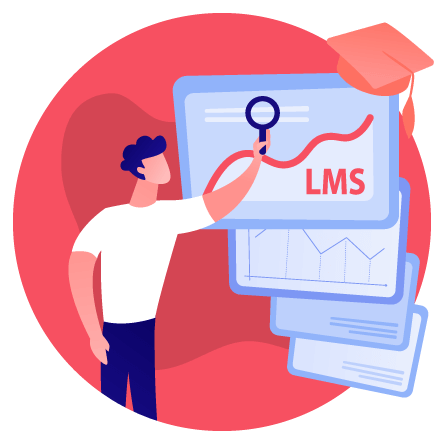
Find The Best LMS For Your Business
What is an LMS?
LMS software is used by businesses to store and create learning materials, host online classes, and allow users to enroll in training courses from a variety of locations.
The main point of an LMS website is to simplify and automate training and development within a company.
The learning management system works by allowing individuals to register for courses, watch videos of lectures online, take quizzes on the material, and receive certificates upon completion.

More about LMS
A business can choose from a variety of pre-made templates or create custom branded LMS coursework that is unique to their needs.
LMS should not be confused with learning management content systems (LCMS), which use a content management system (CMS) to author and manage learning content.
The LMS market is a growing industry that is projected to continue gaining momentum as learning management culture is increasingly adopted across the world. The global LMS market was valued at $8.76 billion in 2019 and is expected to grow to $38.10 billion by 2027.
There are a number of things that should be considered when choosing an LMS platform, such as cost and budgeting, learning styles best suited for the chosen system, whether or not learning content needs to be customizable within certain parameters, usability and design, scalability, security protocols and user interface.
Businesses looking to automate and improve their training methods should be looking to adopt this software.
How LMS Works
Learning management systems are essentially gated websites that people can access by using a user account. Online course materials can then be viewed and completed remotely, making it easy for international or distributed teams to use cohesive materials.
With LMS, all learning content is stored in an LMS cloud so users can easily access course materials from any device with internet capabilities.

Individuals simply need to log in with their smartphone, laptop, or tablet, and complete the required materials.
Customizations such as quizzes, surveys, and learning paths can be added to tailor learning experiences for each individual user.
For marketers and marketing teams, LMS can be used to teach employees about new products, technology updates, and any other learning materials that are relevant.
Above all else, using an LMS is a flexible and accessible way to deliver learning materials to your employees.
Who Needs LMS?
Every company, regardless of size and industry, should consider learning management systems.
Whether you’re looking to train your staff or improve customer satisfaction, learning management platforms can help bolster staff training and streamline internal processes.

This software is a great solution for companies looking to train their staff more efficiently, or those that have remote workforces.
In addition, this is an excellent option for training managers that are looking to easily keep track of learning activities throughout the year.
Larger companies should consider learning management systems to train large groups of distributed employees.
Smaller companies can use LMS to ensure cohesive training from the start, which can become a big asset as you grow and scale. For example, if you’re looking to build longstanding discovery and planning stages from the ground up.
You can use learning management systems to train staff on topics such as:
- Marketing and sales planning processes
- Product development stages and frameworks
- Improving client relationships
- Human resources planning
- Analytics and reporting
- Safety and compliance
- & much, much more
Adding a blog, creating infographics, and listing your business on directories from the start are all great examples of backlinking strategies.
How Much Does LMS Cost?
The cost of a learning management system will differ from business to business.
Depending on your requirements and the suitability of the LMS, the cost varies depending on specific requirements.

Often, your pricing will be based on:
-
- Number of learning activities and users
- Database size and number of courses you’re looking to host (which can affect the amount of storage space you need)
- Additional features such as quizzes, tests, assessments & etc.
Generally, learning management systems are more expensive for businesses with a low learning activity volume.
This means if you are hosting learning activities with a very low frequency, you may need to pay more.
If your learning activity volume is constantly high, then the cost will be lower per activity.
Features are also important when considering the costs of an LMS solution.
Larger companies often have different needs in comparison to start-up businesses. Features such as content storage, learning task assignments, and reporting tools can drive up the cost of your LMS.
Before committing to an LMS, be sure you’ve got the budget in place to use it correctly.
Things To Consider When Choosing LMS
When choosing an LMS, you need to consider the needs of your business and how you plan to use the system.
It’s important that your team is able to use the learning management system you choose, so consider ease of adoption and use.

You’ll also want to appoint an LMS administrator to ensure the learning management system is being managed effectively.
An LMS administrator needs to be able to quickly make changes, such as adding courses or content without delay. This also means that the person behind this role will need a comprehensive understanding of how an LMS works; you’ll want them to know your learning management system inside out before anyone starts using it.
If your company has multiple offices or users, also think about scalability and flexibility options for growing teams.
If you have a large distributed team, it may be worth using a custom branded LMS or customizable LMS that allows you to have cohesive branding.
If you are a smaller team, consider going with an LMS provider that is flexible on pricing and feature inclusion.
Remember, your LMS is an important digital marketing tool that may help to increase learning and reduce staff turnover.
Choosing the right platform from the start can save you a lot of time and money in the long run.
The 15 Best LMS For Your Business
Here it is! The ultimate list of the top 15 LMS platforms for oyur business/
Choosing the right learning management system for your business can be challenging, but it is an important step in making sure your team is learning and growing.

Here are our top 15 learning management systems:
1. Lessonly
If you’re looking for an easy-to-use training, enablement, and coaching learning management system, then Lessonly should be on your radar.
Not only does Lessonly offer custom branded learning content, but it also provides users with an easy-to-use interface that quickly responds to changing needs of your business.
Lessonly helps you organize, track, and manage all onboarding and training efforts within your team. This can help improve learning retention and ramp-up time within various roles.
Trusted by industry leaders such as McAfee, Scholastic, and InVision, Lessonly is great for teams looking to enhance learning efforts across the organization.
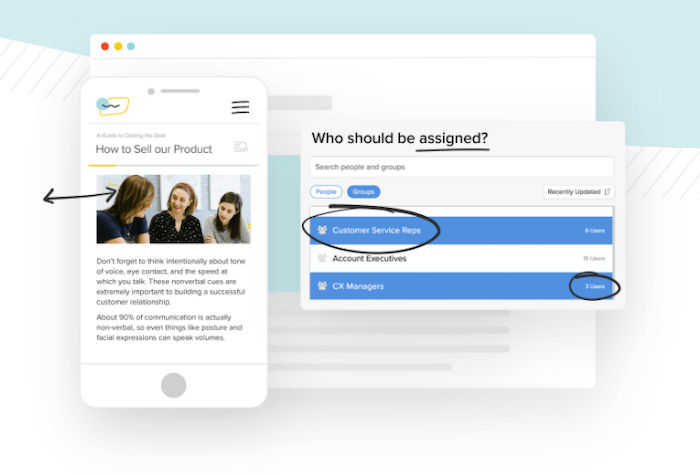
2. LMS Moodle
Moodle is an LMS that allows you to build a custom online learning site in minutes.
Powered with impressive CMS technology, Moodle provides tools for learning activities, quizzes, blogs and forums that can be completely customized to your business.
Moodle is one of the world’s biggest and best-known learning platforms, with the ability to host tens of thousands of active users on its site.
If you’re a legacy brand that wants a custom branded LMS or a smaller company that just invested in a website rebrand, then Moodle may be the pick for you.
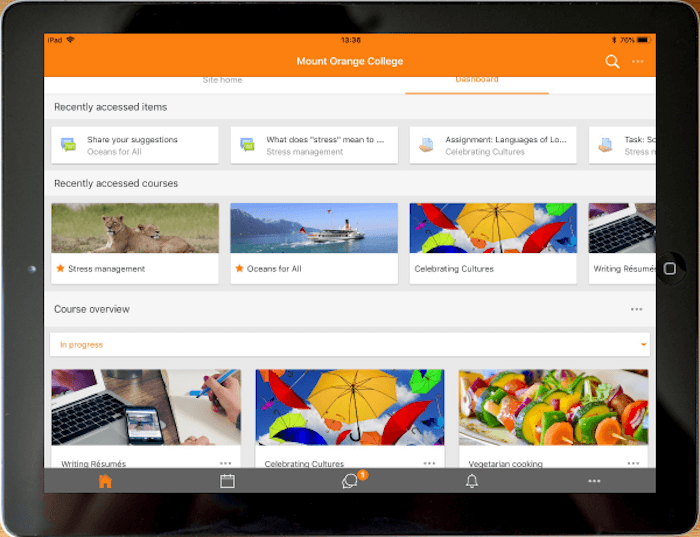
3. LMS Blackboard
Blackboard’s LMS is a simple, intuitive interface that is mostly used by teachers and professors, but that doesn’t mean it’s not a learning-management system built for businesses.
Blackboard offers a wide range of learning tools including discussion boards, group projects and assessments to help facilitate learning for your employees.
One of the best features of Blackboard is its easy-to-use communication tools that allow you to send direct messages or email updates, while also sending out mass communications like announcements and calendars.
Blackboard also offers a mobile app so you and your staff can collaborate from anywhere, anytime.
4. SharePoint LMS
SharePoint is an Office 365 product that’s used to manage learning tools for businesses, including employee onboarding and training.
SharePoint LMS boosts your company’s productivity with its document sharing capabilities as well as apps that help you optimize collaboration among employees.
This LMS is a great choice for companies that already use Microsoft Office products as it can be easily integrated into their current product suite.
5. Relias LMS
Relias is a learning management system that is used by healthcare professionals and learning organizations to implement and monitor training initiatives, including compliance.
This LMS is a great choice for learning professionals in the medical industry because it has add-ons that allow you to create apps specific to your business needs.
The features of this LMS include: course management, custom branding, learning paths; policy and procedure management, requirements tracking, and more.
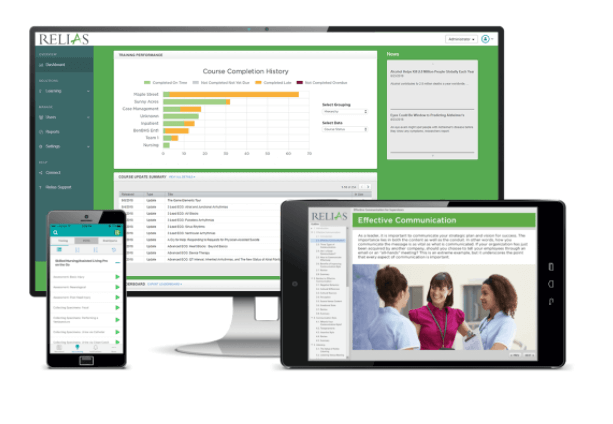
6. Adobe Captivate Prime
Adobe Captivate Prime is an award-winning LMS that lets you deliver personalized learning experiences to employees, customers, and partners.
Complete with AI-based recommendations and personalized learning experiences, this LMS is a learning professional’s dream.
It also has customizable e-learning courses that can be deployed across multiple devices, which makes it ideal for businesses of all sizes and industries.
Plus, Adobe’s LMS gamification makes learning engaging and fun, helping you boost learning retention rates.
The impressive analytics and integration options on the Adobe Captivate Prime platform offer important insights into learning behaviour and learning data.
7. Talent LMS
Talent is your one-stop shop for organizational training and growth.
This powerful LMS comes complete with an intuitive interface, simple setup, and customizable LMS features that will help you connect with team members all over the world.
Trusted by over 70,000 teams, such as eBay, Rosetta Stone, and Duolingo, Talent LMS is great for businesses that need to offer content in multiple languages or teams around the world.
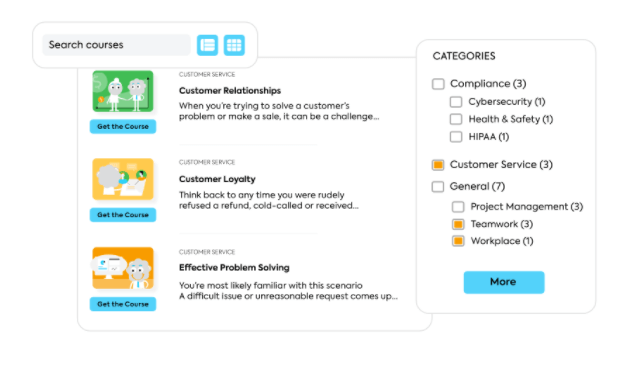
8. 360 Learning
360 Learning makes collaborative education easy with its crowdsourcing options, cohort programs, and interactive course offerings.
This learning management system is known for being fast, efficient, and powerful for teams of all sizes.
360 Learning offers peer-to-peer sharing options that help employees unlock the true character of their talent, grow their skills and improve internal relations all on one simple platform.
As one of the top eLearning platforms in the industry, 360 Learning is great for training employees at any level in a wide range of learning styles, from improving your email marketing to learning to rank on voice search.
9. Absorb LMS
Absorb is a learning management system that believes learning is the key to overcoming business challenges.
They are committed to expediting learning processes within organizations using analysis, reporting, and amazing learning experiences to help learning teams succeed.
Operating as a cloud-based LMS, Absorb offers easy access to anyone with an internet connection.
Used by big-name corporations like Sony, Johnson & Johnson, and GAP, Absorb is great for large organizations that offer training to a global staff base.
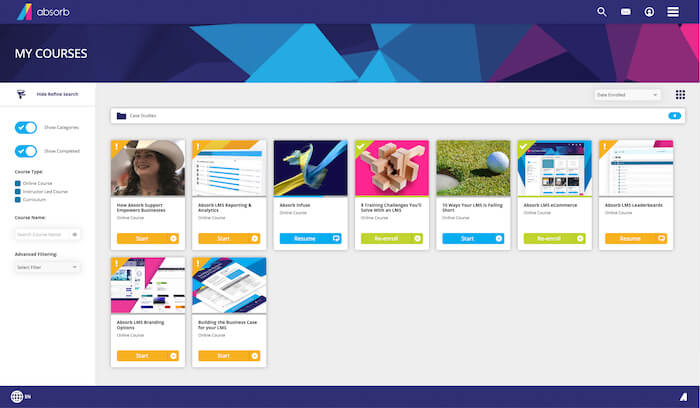
10. Cornerstone Learning
Cornerstone Learning is a scalable learning management system that offers a customizable interface, learning paths for personalized learning, collaboration tools like message boards and file sharing, and more features such as leaderboards and badges.
Cornerstone operates on an open architecture system that is flexible to adapt to learning technology trends.
Its impressive AI engines help your teams identify learning gaps and learning opportunities on the fly.
With Cornerstone, you can:
- Manage learning across the enterprise with a single platform
- Create learning paths for individualized learning experiences to support your company’s unique needs and goals
- Track performance in real-time so teams know where they stand at all times
11. Fuse
Fuse is an LMS that is designed to leverage the intelligence of internal experts in order to give employees the best knowledge possible.
Fuse does this by:
- Allowing learning to be created by subject matter experts specifically for the company and its people
- Crowdsourcing learning content from your employees, regardless of where they are around the globe
- Integrating with both Salesforce CRM and Microsoft Office 365. This means that learning data can easily flow into existing workflows instead of being isolated
Fuse offers a multi-tiered subscription model that allows you to pay only for what you need, it is also 100% customizable.
12. LearnUpon LMS
LearnUpon is a high-impact LMS platform built for growing businesses. It offers scalable training programs that can be used across teams and functions.
LearnUpon comes with built-in learning paths that allow you to set learning goals, assign learning materials and track progress from start to finish.
LearnUpon is easy to set up, use, and offers ROI-tracking and reporting options to help you measure learning success.
With a 24/7 global support line, you’ll always have an easy way to get help.
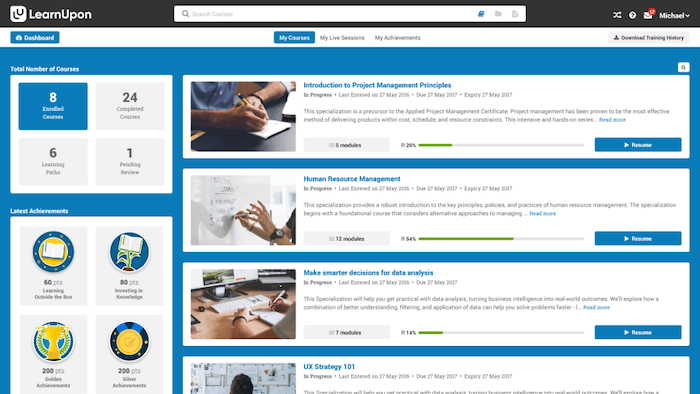
13. Canvas
Canvas learning management system (LMS) by Instructure, Inc., is a learning technology company based in Salt Lake City, Utah that offers the open-source learning platform Canvas as a service via Software as a Service (SaaS).
Canvas is one of the most popular learning management systems (LMS) on the market and is well known for its customization, learning path features, learning analytics and reporting.
Canvas LMS is not just for schools but is built to serve everyone from kindergarten levels all the way to business leaders. They offer three levels of LMS:
- LMS For K-12
- Higher Ed LMS
- LMS For Business
Whether you’re looking to improve your distanced learning methods or scale your business with high-quality employee training, Canvas LMS can help.
14. Zoho LMS
Zoho learning management system (LMS), an online learning platform that enables you to create, deliver and manage training programs at a low cost.
It allows the tracking of trainees’ progress through multiple-choice quizzes built into presentation content allowing trainees to gauge their learning, and making it easy for instructors to track results.
Zoho is a great choice for any business looking to enhance learning and employee engagement.
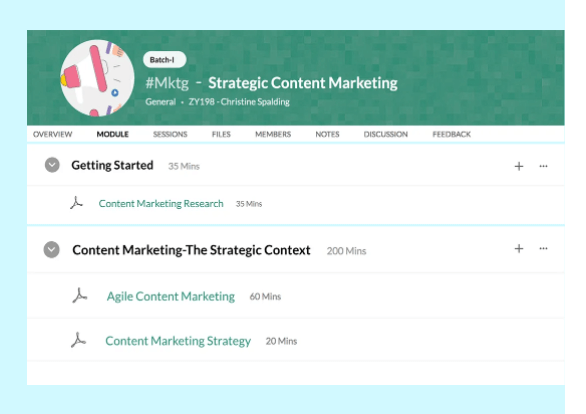
15. Docebo LMS
Docebo is a learning management system that enables you to create content for courses in minutes without writing any code. It provides learning professionals with everything they need out of the box: ready-to-use learning paths, learning content (e-books), assessments, and certificates.
Trusted by companies such as Walmart, AWS, and ZipRecruiter, Docebo is one of the most customizable learning management systems on the market.
16. LMS365
LMS365 is a learning management system built into Microsoft365 and Microsoft Teams.
This system makes it easy for Microsoft users to manage content and courses, track and report employee learning, and engage learners for effective training and growth.
LMS365 is a great choice for businesses that use Microsoft products and want a learning management system that is easy to set up, simple to manage, and seamlessly integrates with other applications.
LMS Frequently Asked Questions
Questions, questions questions… And here are the answers to all your burning LMS questions

- What does LMS mean?
LMS stands for learning management system. These systems are used to track learning content, learning paths/pathways, as well as learning assessments. - What is the purpose of LMS?
A learning management system helps companies manage and track learning content. How does the learning management system work? Learning paths are created by a learning manager, which includes courses and assessments to improve employee skills. - Who needs LMS?
Many companies need an LMS to manage training and development for their employees so that they can be the most efficient and effective at work. These systems are also necessary in order to offer a learning program within a company. - What are examples of LMS?
Examples of LMS include Moodle, Blackboard, Zoho, and other similar learning management systems. - What does an LMS administrator do?
AN LMS administrator is responsible for learning management system’s daily operations. This includes creating learning paths, managing user roles and access levels, setting up learning milestones, training employees on the learning management system, etc. - What LMS is most popular?
The most popular LMS globally is Blackboard, with Canvas following close behind.
Find The Best LMS For Your Business
Whether you’re an established business or a new startup, learning management systems are essential to the growth and success of your company.
An LMS is one tool that empowers employees and helps them learn more about their jobs every day while having fun learning online at work. Most importantly, learning gives everyone in your organization skills they can use anywhere on the job.

Choosing the right LMS for your business depends on a range of factors. If you are an educational institution, you may be looking for an LMS that has learning paths, milestones, and assessment tools.
If your business is a service industry or retail store, you may want an LMS with easy-to-use scheduling capabilities so employees can easily track their shifts. Consider all the features that are important to your business before choosing an LMS platform.
Once you’ve chosen an LMS, don’t be afraid to test it out and ensure your employees are using it properly. You don’t want learning to be an afterthought, so make sure that your employees love learning with the LMS you’ve chosen.
Looking to add an LMS to your business? ALT Agency has helped companies all over Birmingham, UK make use of their own LMS platforms. Contact us to learn more.
Image credits:
designed by Vectorjuice – Freepik.com



 Oct 31, 2022
Oct 31, 2022 





 Contact us
Contact us 
